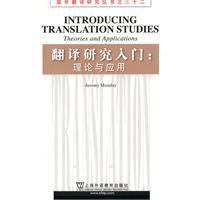內容簡介
《翻譯研究入門:理論與套用》系統介紹了古羅馬以來的翻譯理論流派與思潮,精心繪製了一幅西方譯學研究的進程圖,全面展現了本領域最新的學術成果及研究動向。與同類著述相比,《翻譯研究入門——理論與套用》具有如下鮮明的特點和獨特的價值:強調理論之間的內在聯繫,體現翻譯學的系統性;注重理論與實際相結合,突出翻譯學的實證性;鼓勵進行獨立思考與研究,追求翻譯學的創新性,等等。
作為翻譯學的入門教程,《翻譯研究入門——理論與套用》以通俗易懂的語言對西方翻譯學的產生、發展和壯大進行了梳理,為學生、教師、研究者及翻譯人員等開啟了當代西方譯學研究的新天地。
作者簡介
傑里米·蒙代(Jeremy Munday),英國著名翻譯理論家,著述甚多,主要有:《翻譯中的文體與意識形態》 (Style and Ideology in Translation)、《翻譯研究指南》(A Comparfion to Transtation Studies)、《高級譯學原典讀本》(Translation:Anadvanced Resource Book)(合著)等。
圖書目錄
List of figures and tables
Acknowledgements
List of abbreviations
Introduction
1 Main issues of translation studies
1.1 The concept of translation
1.2 What is translation studies?
1.3 A brief history of the discipline
1.4 The Holmes/Toury 'map'
1.5 Developments since the 1970s
1.6 Aim of this book and a guide to chapters
2 Translation theory before the twentieth century
2.0 Introduction
2.1 'Word.for-word' or 'sense-for-sense'?
2.2 Martin Luther
2.3 Faithfulness, spirit and truth
2.4 Early attempts at systematic translation theory: Dryden,Dolet and Tytler
2.5 Schleiermacher and the valorization of the foreign
2.6 Translation theory of the nineteenth and early twentieth centuries in Britain
2.7 Towards contemporary translation theory
3 Equivalence and equivalent effect
3.0 Introduction
3.1 Roman Jakobson: the nature of linguistic meaning and equivalence
3.2 Nida and 'the science of translating
3.3 Newmark: semantic and communicativetranslation
3.4 Koller: Korrespondenz and Aquivalenz
3.5 Later developments in equivalence
4 The translation shift approach
4.0 Introduction
4.1 Vinay and Darbelnet's model
4.2 Catford and translation 'shifts'
4.3 Czech writing on translation shifts
4.4 Van Leuven-Zwart's comparative——descriptive model of translation shifts
5 Functional theories of translation
5.0 Introduction
5.1 Text type
5.2 Translational action
5.3 Skopos theory
5.4 Translation.oriented text analysis
6 Discourse and register analysis approaches
6.0 Introduction
6.1 The Hallidayan model of language and discourse
6.2 House's model of translation quality assessment
6.3 Baker's text and pragmatic level analysis: a coursebook for translators
6.4 Hatim and Mason: the semiotic level of context and discourse
6.5 Criticisms of discourse and register analysis approaches to translation
7 Systems theories
7.0 Introduction
7.1 Polysystem theory
7.2 Toury and descriptive translation studies
7.3 Chesterman's translation norms
7.4 Other models of descriptive translation studies:Lambert and van Gorp and the Manipulation School
8 Varieties of cultural studies
8.0 Introduction
8.1 Translation as rewriting
8.2 Translation and gender
8.3 Postcolonial translation theory
8.4 The ideologies of the theorists
9 Translating the foreign: the (in)visibility of translation
9.0 Introduction
9.1 Venuti: the cultural and political agenda of translation
9.2 Literary translators' accounts of their work
9.3 The power network of the publishing industry
9.4 Discussion of Venuti's work
9.5 The reception and reviewing of translations
10 Philosophical theories of translation
10.0 Introduction
10.1 Steiner's hermeneutic motion
10.2 Ezra Pound and the energy of language
10.3 The task of the translator: Walter Benjamin
10.4 Deconstruction
11 Translation studies as an interdiscipline
11.0 Introduction
11.1 Discipline, interdiscipline or sub-discipline?
11.2 Mary Snell-Hornby's 'integrated approach'
11.3 Interdisciplinary approaches
11.4 The future: co-operation or fragmentation?
Appendix: internet links
Notes
Bibliography
Index

